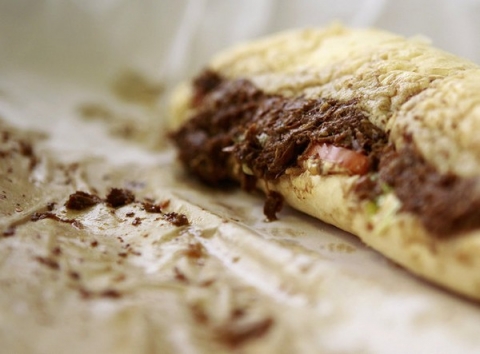
History has it that the po-boy was invented by the Martin brothers, Benny and Clovis, to feed striking streetcar drivers in New Orleans in 1929.
According to an account on the website of the Oak Street Po-Boy Festival, Benny Martin once said: "We fed those men free of charge until the strike ended. Whenever we saw one of the striking men coming, one of us would say, 'Here comes another poor boy.'"
It is true that the Martin brothers wrote a letter, addressed to the striking drivers and printed in at least one local newspaper, in which they promised to feed the men. "Our meal is free to any members of Division I94," they wrote, omitting any description of what that meal might be.
But history is often not neat. The explanation for how things came to be can change over time. What is accepted as gospel in one generation may bear little resemblance to what was previously believed. Sometimes what sticks is the best story. This is how legends are made.
The generally accepted and oft-repeated story of how the celebrated po-boy sandwich was invented first appeared in a New Orleans newspaper in 1969, 40 years after the streetcar strike. But before that the tale was different.
In 1933, The New Orleans States wrote about the Martin brothers as they marked their grand opening at a new location, a story that appeared alongside a large advertisement paid for by the shop. The States told how the Martins came to the city from Raceland and began selling "sandwiches of half a loaf of French bread generously filled with whatever one desired, from roast beef to oysters" near the old French Market. They later moved to the corner of Dumaine and Decatur before returning to the French Market, where they stayed until 1929. Based on this version of events, Benny and Clovis Martin were selling the sandwich years before the labor dispute sent streetcar drivers to the picket line.
The States then described how the sandwich got its unusual name, an account similar to those repeated throughout the 1940s and 1950s.
"From the hard-pressed truck farmers of St. Bernard, who gathered daily on the curb along North Peters Street with their produce, came the name of Poor Boy," the paper wrote.
There are other mysteries about the official history of the po-boy. One involves New Orleans' most famous son.
In his autobiography, jazz great Sidney Bechet writes of joining with a cornet player he had never heard play to promote a show at a local theater, presumably sometime in the 1910s.
"I hired Louis (Armstrong) to come with me on this advertising, and, you know, it was wonderful," Bechet writes in "Treat It Gentle," published in 1960.
"Anyway, I gave him 50 c., I gave the drummer, Little Mack, 50 c., and that meant I made a dollar; the leader always kept the double. That was the first time I ever heard Louis play the cornet. He played the cornet then, though he went to the trumpet later.
"We went out and bought some beer with the money and got those sandwiches, Poor Boys, they're called – a half a loaf of bread split open and stuffed with ham. We really had good times."
It is possible that Bechet learned of the po-boy later and embellished the story of his early gig with Armstrong. But it's worth noting that Bechet's exposure to New Orleans later in his life was limited. He was long gone from the city by the time of the 1929 streetcar strike during which the po-boy was supposedly invented. Bechet moved north in 1917, years before Benny and Clovis Martin had even arrived in the city. Armstrong left New Orleans, too, moving to Chicago in 1922.

